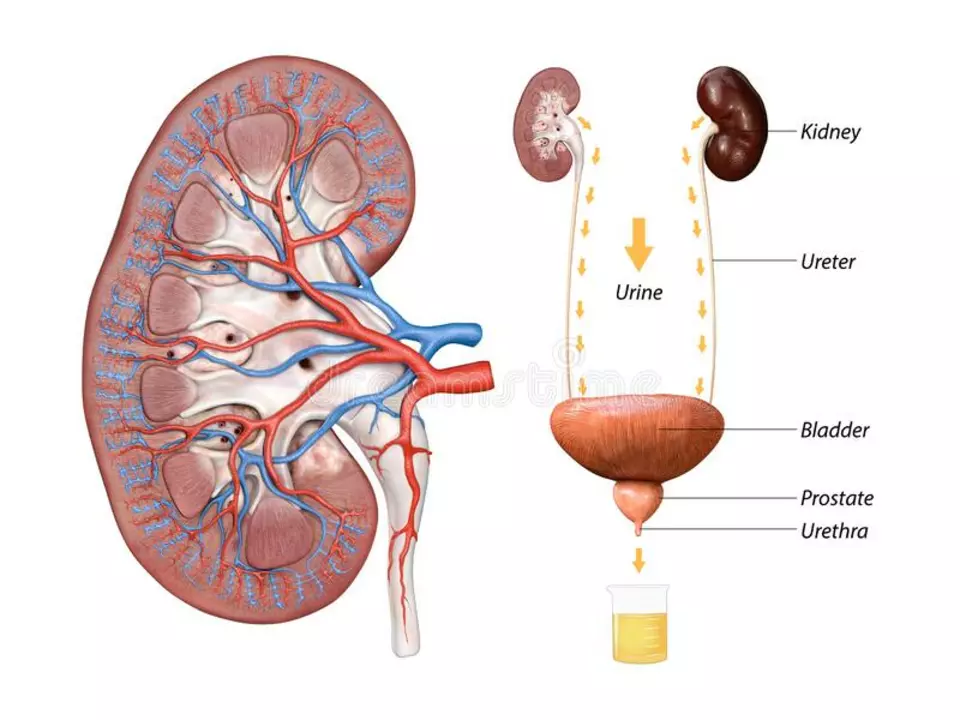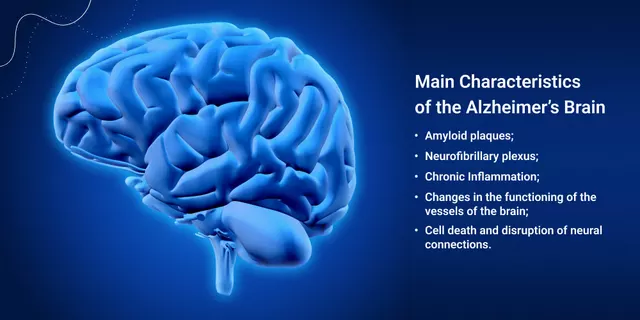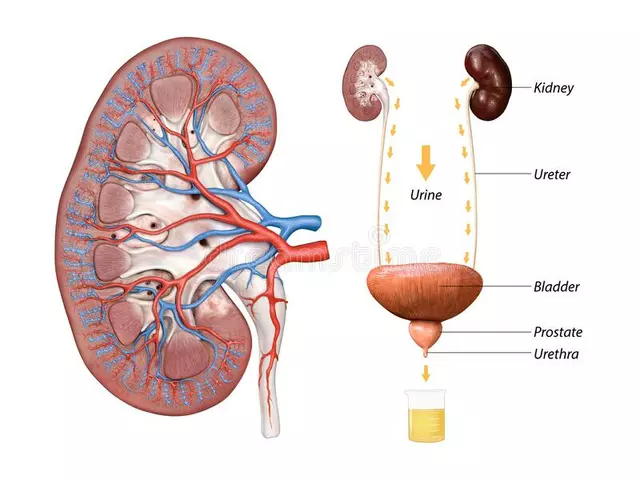An Introduction to Kidney Functions in Bed-wetting
As a blogger dedicated to helping people understand complex health issues, I have received many questions about bed-wetting, especially in relation to the role of the kidneys. In this article, I will discuss how the kidneys function and their role in bed-wetting, aiming to provide you with a better understanding of this common issue. We will explore the following topics:
The Anatomy and Function of Kidneys
Before diving into the role of kidneys in bed-wetting, it's essential to understand the anatomy and function of these vital organs. The kidneys are bean-shaped organs located near the middle of your back, just below the rib cage. Their primary function is to filter waste products and excess substances, such as water, from the blood to form urine. This waste removal process is crucial for maintaining a proper balance of electrolytes and fluid in the body, as well as regulating blood pressure and other essential functions.
How Kidneys Regulate Urine Production
Now that we have a basic understanding of the kidneys' function let's discuss how they regulate urine production. The kidneys filter approximately 120 to 150 quarts of blood daily, producing about 1 to 2 quarts of urine. The amount of urine produced by the kidneys depends on several factors, including fluid intake, diet, and overall health. However, one of the most critical factors in urine production is the hormone vasopressin, also known as antidiuretic hormone (ADH). ADH is responsible for regulating the amount of water reabsorbed by the kidneys, and thus, controlling the volume of urine produced. When ADH levels are high, the kidneys reabsorb more water, producing concentrated urine. Conversely, when ADH levels are low, the kidneys reabsorb less water, leading to diluted urine and increased urine production.
Understanding Nocturnal Enuresis (Bed-wetting)
Nocturnal enuresis, commonly known as bed-wetting, is the involuntary release of urine during sleep. Although bed-wetting can affect people of all ages, it is more common among children, particularly those under the age of 7. Bed-wetting can be classified into two types: primary and secondary. Primary nocturnal enuresis refers to bed-wetting in a child who has never had a prolonged period of being dry at night, whereas secondary nocturnal enuresis occurs in a child who has been dry at night for at least six months but has started wetting the bed again.
Role of Kidneys in Bed-wetting
So, how do the kidneys play a role in bed-wetting? As mentioned earlier, the production of urine is regulated by the hormone vasopressin (ADH). Research has shown that some children who experience bed-wetting may have a deficiency in the production or release of ADH during sleep. This deficiency can cause the kidneys to produce more urine than the bladder can hold, leading to bed-wetting. Additionally, some children may have a lower functional bladder capacity, meaning their bladder cannot hold as much urine as it should. This issue, combined with increased urine production due to low ADH levels, can contribute to bed-wetting incidents.
Diagnosing and Treating Kidney-related Bed-wetting
If you suspect that your child's bed-wetting may be related to a kidney issue, it is essential to consult with a healthcare professional for proper diagnosis and treatment. A thorough evaluation, including a detailed medical history, physical examination, and possibly some laboratory tests, will help determine the cause of the bed-wetting and the best course of action. Treatment options for kidney-related bed-wetting may include medications to increase ADH production, bladder training exercises, or, in some cases, addressing any underlying kidney or urinary tract issues.
Preventive Measures and Lifestyle Changes
While kidney-related issues may be the cause of bed-wetting in some cases, it's essential to keep in mind that bed-wetting can also result from other factors, such as stress, sleep disorders, or an immature nervous system. Regardless of the cause, incorporating specific preventive measures and lifestyle changes can help reduce the frequency of bed-wetting incidents. These may include limiting fluid intake before bedtime, encouraging regular bathroom breaks throughout the day, establishing a consistent bedtime routine, and offering support and reassurance to your child.
In conclusion, understanding the role of the kidneys in bed-wetting is crucial in helping to identify and address the underlying cause of this common issue. By being informed and proactive, you can help your child overcome bed-wetting and improve their overall well-being.





zaza oglu
April 29, 2023 AT 04:27Hey folks! Let’s take a moment to appreciate how amazing our kidneys are-they’re like tiny, diligent librarians that sort out waste while keeping the body’s water balance in check. When it comes to bedtime accidents, a dip in ADH can turn those librarians into over‑eager water‑spillers, flooding the bladder overnight. It’s perfectly normal for kids to have a temporary lag in hormone production, so don’t panic if the bed gets a little soggy. The good news is that simple steps-like limiting fluids before lights‑out and encouraging regular bathroom trips-can make a huge difference. Remember, each child’s rhythm is unique, and a supportive, patient approach goes a long way in building confidence.
Vaibhav Sai
April 30, 2023 AT 16:27Great points, Zaza! I’d add that consistency in bedtime routines really helps train the body’s internal clock-yeah, even the kidneys love a good schedule! Also, keeping a water‑journal can spotlight any sneaky evening sips that might be contributing to the nightly drip. Keep it up, everybody!!!
Lindy Swanson
May 2, 2023 AT 04:27Kidneys aren’t the only culprit for night wetting, you know.
Amit Kumar
May 3, 2023 AT 16:27Totally agree 😄! Stress, sleep cycles, and even the bladder’s own personality can throw a wrench in the works. Keep the vibes positive and the fluids in check, and you’ll see progress!
Crystal Heim
May 5, 2023 AT 04:27Let me lay it out plainly. The kidneys filter blood and manage water balance. ADH tells them to hold onto water at night. When ADH drops the kidneys release more urine. A full bladder can’t hold the extra volume. This leads to bedwetting. Children often have immature bladder control. Their nervous system may not signal a full bladder effectively. Some kids simply drink more fluids before bedtime. Others may have a genetic predisposition to lower ADH secretion. A thorough medical evaluation can rule out infections or anatomical issues. Simple behavioral changes often help. Limiting evening drinks reduces nighttime urine production. Scheduled bathroom trips train the bladder. Bedwetting alarms can condition the body to wake up. Medications that increase ADH are an option for some. Bladder training exercises strengthen capacity. Emotional support prevents shame. Parents should stay calm and encouraging. Consistency is key in any approach. With patience most kids outgrow the problem.
Sruthi V Nair
May 6, 2023 AT 16:27Insightful overview Crystal. It reminds us that physiological and psychological factors intertwine. Encouraging a growth mindset can empower children to view setbacks as learning steps rather than failures.
Mustapha Mustapha
May 8, 2023 AT 04:27From my experience watching kids grow, a calm and inclusive environment makes a big difference. When families talk openly about the issue, kids feel less embarrassed and more motivated to try the practical tips we discussed.
Ben Muncie
May 9, 2023 AT 16:27People need to stop normalizing excuses and take responsibility for simple lifestyle tweaks. It’s not a moral failing, but it is a habit that can be changed.
kevin tarp
May 11, 2023 AT 04:27Just a quick note: the article says “its essential” where it should be “it’s essential.” Small errors can distract readers.
ravi kumar
May 12, 2023 AT 16:27Honestly, this whole discussion feels too Western‑centric. In many Indian homes, we rely on traditional remedies and a strong sense of discipline rather than endless medical testing. It’s time to respect our own cultural practices while still being open to science.